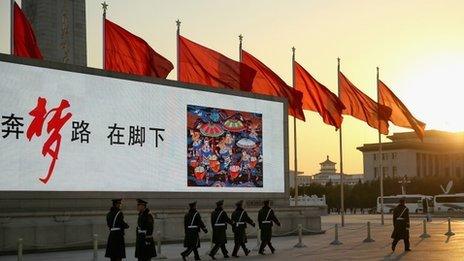China media: Third Plenum
- Published

Economic reforms and security were discussed at the Communist Party's plenum
Most media in mainland China and Hong Kong give a mixed response to a new communiqué, external on reforms released after the annual plenum of the Communist Party.
The Beijing News, external says the "biggest breakthrough" in the reform package is the creation of a team at the highest level to oversee change across many sectors which have been stalled because of vested interests.
In contrast, Hong Kong's South China Morning Post, external says the document "leaves blanks" in key policy areas watched by global investors, such as breaking the monopolies of the state-run sector and bringing in a more level playing field for state and private companies.
"Yesterday's communiqué stopped short of giving details of such reforms, merely acknowledging the importance of the market in allocating resources... The communiqué was also vague on the overall importance of financial reforms. It only mentioned the objective of 'improving and perfecting the financial market system,'" the paper notes.
The newspaper, external also says that although party leaders promised to boost the independence of the judiciary and improve systems to tackle corruption, such moves are aimed at "shoring up the legitimacy and control of the ruling party".
"No Western-style political reform ideas were mentioned. The stress is still on developing the economy, which the leadership believes to be the key to the problems facing China," it adds.
KGB-style committee?
Another key topic is the CPC's plan to set up a national security committee to co-ordinate security strategies across various departments, including intelligence, the military, foreign affairs and the police in order to cope with growing challenges to stability at home and abroad.
The challenges include maritime territorial disputes with neighbours such as Japan and the Philippines, as well as the "strategic containment" of China by unnamed external forces, notes Ta Kung Pao, external, a Beijing-backed Hong Kong newspaper.
The People's Daily, external Overseas Edition says the new committee will prevent various departments from failing to communicate with each other or "pass the buck" on security responsibilities.
Beijing's Global Times, external also notes that unrest in the ethnic minority regions of Xinjiang and Tibet are being manipulated by unnamed "external forces".
"With China's opening up as well as the strengthening of rivalry among the great powers, the interest of external forces in using China's internal problems in games with us is increasing and they also have more and more levers," the newspaper warns.
Hong Kong's South China Morning Post, external writes that a national security agency was first mooted more than 30 years ago, but the idea was "hindered by vested interests that stand to lose power in a reshuffle".
However, some commentators and journalists are comparing the committee to the former Soviet Union's once-feared security body, the KGB, rather than the US National Security Council.
"All security committees of communist regimes have a bad reputation. It is another step taken by the party to consolidate its power," mainland activist Hu Jia tells SCMP.
Apple Daily, external reporter Chan Pui-man believes that a "KGB"-style security agency is a sign that Beijing will again try to legislate a controversial anti-subversion law known as Article 23 in Hong Kong.
Hundreds of thousands of Hong Kongers took to the streets to oppose the proposed bill in 2003.
'Strongman politics'
The Apple Daily, external speculates that Communist Party General Secretary Xi Jinping may be using the new agency to copy the "strongman politics" of Russian President Vladimir Putin to secure greater power in an internal party "power struggle".
"Real power is still constrained by former general secretaries Jiang Zemin and Hu Jintao and constrained by major elite groups. Xi Jinping has a chance to really take power through this power mechanism of the national security committee that overrides the party, government and military," the paper concludes.
Hong Kong's Ming Pao, external says Mr Xi may even surpass his predecessors in consolidating power.
"As the country's highest party leader, besides nominal titles, Xi Jinping will actually wield substantive power over reform and national security through these two organisations. He will have real power, which at least Hu Jintao and Jiang Zemin did not have before," says the newspaper.
BBC Monitoring, external reports and analyses news from TV, radio, web and print media around the world. For more reports from BBC Monitoring, click here. You can follow BBC Monitoring on Twitter , externaland Facebook, external.